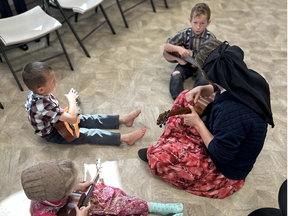Education
Rural Students Thrive as Music Education Gains Vital Support

A new survey reveals that music education is essential for rural students, highlighting its profound impact on mental health and community connection. According to a recent study by MusiCounts, Canada’s music education charity, a significant majority of Canadians—86%—believe that music education should be accessible to all schools. With funding challenges forcing schools to prioritize essential programs, many rural institutions, particularly in Manitoba, face dire shortages of music resources.
At Albright School, located on the Oak Bluff Hutterite Colony near Morris, the introduction of a music program is transforming the educational landscape. This fall, 34 students began learning to play instruments, including guitars and ukuleles, provided through a substantial investment from MusiCounts. “We’ve always had students eager to learn,” said teacher Jessica Maendel. “The heartbreaking part was having to tell them we simply didn’t have enough instruments.” This challenge was alleviated when Albright was selected as one of 85 under-resourced schools across Canada to receive part of MusiCounts’ record $1.1 million investment in classroom instruments.
The joy experienced at Albright reflects a broader sentiment among Canadians regarding the benefits of music education. The MusiCounts-Harris Poll indicates that nearly 60% believe that actively making music positively affects mental well-being, with 56% linking music education to improved mental health. This finding is especially relevant in rural communities, where access to formal counseling services may be limited. “Music classrooms are the beating heart of any school,” stated Kristy Fletcher, President of MusiCounts. “When students build connections and express themselves through music, we’re giving them tools to thrive both in and outside the classroom.”
Despite the overwhelming public support for music programs, the survey also highlights the precarious nature of music education across the country. MusiCounts reports that they can only support about one in five schools that apply for assistance, and 20% of applicants indicate they receive no annual funding for music. This issue is particularly acute in rural areas where small enrollments and limited transportation options complicate access to musical opportunities. Maendel emphasized, “Students in big cities may take band class for granted. For us, having instruments at all is life-changing.”
The urgent need for support is underscored by the upcoming Giving Tuesday on December 2, 2023. MusiCounts is encouraging Canadians to contribute to the strengthening of music programs, particularly in underfunded areas. Those interested in supporting music education can find more information or make a donation at musicounts.ca.
In conclusion, the findings of this survey and the experiences at Albright School illustrate the vital role that music education plays in fostering not only artistic expression but also essential mental health support for students in rural communities across Canada. The call for equitable access to music education is more pressing than ever, as schools navigate funding challenges while striving to meet the needs of their students.
-

 Politics3 weeks ago
Politics3 weeks agoSecwepemc First Nation Seeks Aboriginal Title Over Kamloops Area
-

 World4 months ago
World4 months agoScientists Unearth Ancient Antarctic Ice to Unlock Climate Secrets
-

 Entertainment5 months ago
Entertainment5 months agoTrump and McCormick to Announce $70 Billion Energy Investments
-

 Lifestyle4 months ago
Lifestyle4 months agoTransLink Launches Food Truck Program to Boost Revenue in Vancouver
-

 Science5 months ago
Science5 months agoFour Astronauts Return to Earth After International Space Station Mission
-

 Technology3 months ago
Technology3 months agoApple Notes Enhances Functionality with Markdown Support in macOS 26
-

 Top Stories2 months ago
Top Stories2 months agoUrgent Update: Fatal Crash on Highway 99 Claims Life of Pitt Meadows Man
-

 Lifestyle3 months ago
Lifestyle3 months agoManitoba’s Burger Champion Shines Again Amid Dining Innovations
-

 Sports5 months ago
Sports5 months agoSearch Underway for Missing Hunter Amid Hokkaido Bear Emergency
-

 Politics4 months ago
Politics4 months agoUkrainian Tennis Star Elina Svitolina Faces Death Threats Online
-

 Politics4 months ago
Politics4 months agoCarney Engages First Nations Leaders at Development Law Summit
-

 Technology5 months ago
Technology5 months agoFrosthaven Launches Early Access on July 31, 2025




















